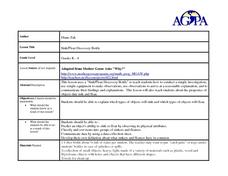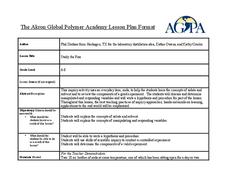Curated OER
A Hidden Beauty
Expose the beautiful mystery of bulbs as young botanists learn all about these fascinating plants. They glean information from a short text before observing actual bulbs (consider an onion), and comparing their findings with predictions....
Curated OER
How Scientists Work
The arsenal of tools a scientist uses to observe the world are varied. This great presentation gives students a look at some of the strategies they should use when looking at the world around them. The information can be used as a...
Omaha Zoo
I Like to Move It
What do lemurs do best? They move! Lemurs like to jump, run, hop, and climb and it's your class's job to document seven fun lemur behaviors. The class starts by discussing why lemurs are considered primates, and then they isolate seven...
Curated OER
TE Activity: Bubbling Plants
Learners study a way to quantify the process of photosynthesis during a given time using the Elodea plant. They design a hypothesis that they test in the hands on activity. They compare the amounts of photosynthesis that occur during low...
Curated OER
Generating Hypotheses and Experimental Design 1
Here is a thorough exercise in forming hypotheses for scientific investigations. Young scientists consider factors that may be related to the question they would like to address. They think through measurable changes that may result from...
Curated OER
Generating Hypotheses & Experimental Design 2
An outline walks your scientists through the steps of the scientific process. It begins by taking a general idea and developing a hypothesis based on related factors. Each investigator then plans a method for testing the hypothesis,...
Alabama Learning Exchange
WATER You Doing to Help?
Auntie Litter is here to educate young scholars about water pollution and environmental stewardship! Although the 15-minute video clip is cheesy, it's an engaging look at the water cycle and conservation. Learners start by illustrating...
Curated OER
Peer Review Form for Scientific Writing
A peer review form just for science? Specifically tailored for science writing, this resource asks editors to give detailed responses to questions about the relevance of the study, the clarity of the hypotheses, the methods, materials,...
Curated OER
Scientific Method: How Many Drops of Water Fit on a Coin?
Young investigators conduct an experiment using the scientific method. They see how many drops of water fit on a coin; have them conduct several different trials. This involves making a hypothesis, looking at controls, and introducing...
Curated OER
Exploration of "Pillbugs"
Fifth graders define vocabulary terms, identify the characteristics of a pillbug, and create a dichotomous key. Then they examine the pillbugs and make observations and record these observations. Finally, 5th graders observe specific...
Curated OER
Science and Measurement
A great start to activate thinking about the scientific method, instruments, measurements, accuracy, constants and laws. Each slide describes important procedures and examples essential for the study of science.
Curated OER
An Introduction to Microbes and Microbes Are Everywhere
Seventh graders define the term microbe. They identify the five main groups of microbes. Students give examples of ways in which microbes have impacted or currently impact human life. They create a hypotheses for where they expect to...
Curated OER
The Scientific Method
Students study the steps involved in the scientific method. They apply the scientific method to their science fair projects.
Curated OER
Experiment Report (Normal Form)
Here is a handy handout to give any science class as a guide to writing lab reports. It is a blank outline that you can have aspiring scientists fill out when they experiment, or imitate as they record their experiments in a lab journal....
Curated OER
Plants, Ecology, Seed Planting
First graders use senses to examine objective or events, then gather and interpret data with instruments. They design invention to support or refute hypothesis, then generate, record, and organize data. They improve environmental...
Curated OER
It's not as pretty as it looks!
Tenth graders investigate that measurement is often an inact science. They explore ways utilize available information to form hypotheses. Students investigate how to test hypotheses using the HACH test kits.
Curated OER
Identifying Birds
Eighth graders identify and name birds in their school yard by comparing and contrasting pictures of 12 common birds in the Phoenix metro area using the Ecology Explorers Protocol. They formulate questions based on observations that lead...
Curated OER
Sink/Float Discovery bottle
Investigate which items float and which ones sink using this resource. Learners participate in an activity in which they investigate this phenomena. Then they describe the experimental process, and learn how to display their results.
Curated OER
What's New With Dinosaurs?
Students examine how scientists are at odds on whether or not dinosaurs were warm or cold blooded. In this dinosaurs lesson plan students divide into groups and research the evidence that supports each side.
Curated OER
Types of Marine Debris
Students conduct an experiment. In this marine debris and environment protection activity, students categorize trash into piles, predict whether these trash items will sink, float or be picked up and carried by the wind and then...
Curated OER
Beach Life: Clam Dissection
Students investigate clams. In this clam life lesson, students conduct an experiment where they dissect clams. Students compare anatomies of humans and clams.
Curated OER
Modeling changes to Ecosystems Part 1
Students record changes in an ecosystem. In this science lesson students make a hypothesis about changes in a terrarium. They record their observations. The students conduct an experiment to test their hypothesis.
Curated OER
Maggie's Earth Adventures-Don't Get Caught-Solve the Next Problem, Too!
In this problem solving worksheet, middle schoolers are given a series of events that occur in the Chesapeake Bay related to the rockfish. Students provide a solution to saving endangered fish and they use information/data to hypothesize...
Curated OER
Study the Fizz
Students experiment to determine which bottle of soda has more dissolved carbon dioxide. In this solutions lesson, students use the scientific method to test the amount of carbon dioxide in bottles of soda. They identify and explain the...

























